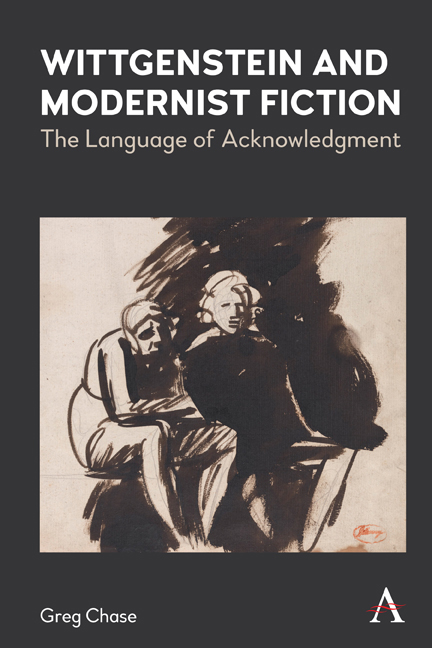Book contents
- Frontmatter
- Contents
- Acknowledgments
- List of Abbreviations
- Introduction: Modernist Philosophy and Modernist Fiction
- 1 “Who’s ‘We’?”: Claims to Community in Forster’s Howards End and Woolf ’s Mrs. Dalloway
- 2 “The Silent Soliloquy of Others”: Wittgenstein’s Pursuit of Acknowledgment
- 3 “To See with the Same Eyes”: Marriage and Same-Sex Intimacy in Ford, Woolf, and Larsen
- 4 Fragmenting Families, Private Language Fantasies: Faulkner’s The Sound and the Fury and As I Lay Dying
- 5 Seeing Humans as Humans: Wright’s Black Boy and Ellison’s Invisible Man
- Conclusion: Afterlives of Acknowledgment
- Notes
- Bibliography
- Index
3 - “To See with the Same Eyes”: Marriage and Same-Sex Intimacy in Ford, Woolf, and Larsen
Published online by Cambridge University Press: 27 April 2022
- Frontmatter
- Contents
- Acknowledgments
- List of Abbreviations
- Introduction: Modernist Philosophy and Modernist Fiction
- 1 “Who’s ‘We’?”: Claims to Community in Forster’s Howards End and Woolf ’s Mrs. Dalloway
- 2 “The Silent Soliloquy of Others”: Wittgenstein’s Pursuit of Acknowledgment
- 3 “To See with the Same Eyes”: Marriage and Same-Sex Intimacy in Ford, Woolf, and Larsen
- 4 Fragmenting Families, Private Language Fantasies: Faulkner’s The Sound and the Fury and As I Lay Dying
- 5 Seeing Humans as Humans: Wright’s Black Boy and Ellison’s Invisible Man
- Conclusion: Afterlives of Acknowledgment
- Notes
- Bibliography
- Index
Summary
In the final scene of Mrs. Dalloway (1925), Sally Seton, Clarissa's friend and erstwhile romantic interest, speaks of the barriers that restrict us in our efforts to know other people:
For what can one know even of the people one lives with every day? she asked. Are we not all prisoners? She had read a wonderful play about a man who scratched on the wall of his cell, and she had felt that was true of life—one scratched on the wall.
Sally here provides an apt expression of the skeptical position that Wittgenstein's Philosophical Investigations (1953) seeks to challenge. But what is it about the “particular circumstances” (PI, §154) of Sally's life that have led her to this defeatist understanding of her epistemological position vis-à-vis other subjectivities? This kind of question is one that works of fiction can (and do) answer more perspicaciously than Wittgenstein's Investigations. Here, it is telling that Sally, specifically, voices this sense of epistemological limitation, since the novel suggests that her and Clarissa's aborted romantic relationship may have offered possibilities of interpersonal intimacy lacking in the more conventional marriages into which both women eventually enter. Clarissa recalls “the purity, the integrity, of her feeling for Sally,” which possesses “a quality which could only exist between women.” Her comments suggest that those looking to do more than simply scratch on the wall of another's inner life may find heterosexual marriage disappointing and need to seek out unconventional alternatives. In this way, Mrs. Dalloway raises a philosophical issue that Woolf 's next novel, To the Lighthouse (1927), takes up: Are there particular forms of social relation that most fully enable interpersonal intimacy? Is heterosexual monogamous marriage the ideal vehicle for intimate knowledge of another? Or might a different type of relationship—say, between two individuals of the same gender—enable even stronger forms of intimacy?
These are epistemological questions, but they are also historical ones. Both Wittgenstein and Woolf wrote during a period of increasing popular dissatisfaction with the social norms surrounding Victorian marriage: an institution that came to look increasingly outdated in a twentieth-century context, its patriarchy and oppressiveness increasingly apparent.
- Type
- Chapter
- Information
- Wittgenstein and Modernist FictionThe Language of Acknowledgment, pp. 83 - 118Publisher: Anthem PressPrint publication year: 2022



